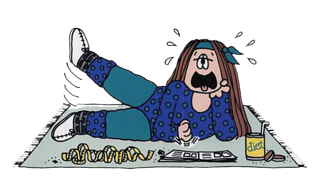Cathy is potently of a time when a very specific subspecies of verbal irony became a thing. The roughly annual collections of the strip from its early years bear such mordant titles as What’s a Nice Single Girl Doing With a Double Bed?! (1981), I Think I’m Having a Relationship with a Blueberry Pie! (1981), Wake Me Up When I’m a Size 5 (1985), and Thin Thighs in Thirty Years (1986). Even the bio on the back of the latter uses sarcasm: “Creator Cathy Guisewite was named one of the ‘Twenty-Five Most Influential Women in America’ by the World Almanac and Book of Facts… and has belonged to a health club for four years that she’s been to twice.”
Normally sarcasm is cruel, but Cathy’s irony is not critical of a person or institution or ideal: it’s circumstantial and self-directed. It is self-policing sarcasm, the kind that acknowledges the unfairness of a situation while simultaneously foreclosing the expectation that the situation can be improved. It substitutes attitude for action. In one comic, Cathy’s friend Andrea, a former feminist now hell-bent on marriage and children, generalizes thusly:
A man looking for a wife is “sincere.” A woman looking for a husband is “desperate.” A man looking for a wife is “mature.” A woman looking for a husband is “desperate.” A man looking for a wife is “caring,” “open,” and “adult.” A woman looking for a husband is “desperate, desperate, desperate!”
“Makes you feel kind of desperate, doesn’t it?” says Cathy; Andrea replies by stuffing a huge spoonful of ice cream into her mouth and grunting, “Mblgpf.” The irony—one to which Cathy returns consistently over the years—is that Andrea’s observation should be a tool to oppose the patriarchy, but having identified the double standard doesn’t make her any less subject to it—and certainly doesn’t make her feel better, at least not in the way eating ice cream does.
By the time Cathy began, the sexual revolution had ended, so the strip stands as a perfect artifact of a moment when the cultural understanding of coercion changed completely—a moment when, one could argue, second-wave feminism basically died. With its baby-boomer characters, Cathy dramatizes the aftermath: the ’60s ended when it became clear that a revolutionary movement toward a just society...
You have reached your article limit
Sign up for a digital subscription and continue reading all new issues, plus our entire archives, for just $1.50/month.
Already a subscriber? Sign in





